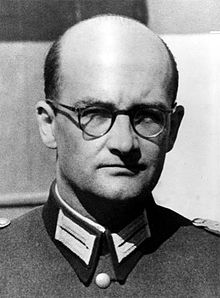Albrecht Mertz von Quirnheim
| Albrecht Mertz von Quirnheim | |
|---|---|

Albrecht Mertz von Quirnheim
|
|
| Born |
25 March 1905 Munich, Kingdom of Bavaria, German Empire |
| Died | 21 July 1944 (aged 39) Berlin, Nazi Germany 52°30′28″N 13°21′44″E / 52.507892°N 13.36219°E |
| Allegiance |
Template:Country data Weimar Germany |
| Service/branch | Army |
| Years of service | 1923–1944 |
| Rank | Colonel |
| Battles/wars | World War II |
Albrecht Mertz von Quirnheim (25 March 1905 – 21 July 1944) was a German Army colonel and a resistance fighter in Nazi Germany involved in the 20 July plot against Adolf Hitler.
Quirnheim was born in Munich, Bavaria, the son of Hermann Mertz von Quirnheim, a captain on the Bavarian General Staff, and the nephew of Walter Hohmann. He spent his youth in the Bavarian capital before his father became head of the Imperial Archive (the Reichsarchiv) and the family moved to Potsdam in Prussia. As a child he befriended Hans-Jürgen von Blumenthal and as a young man came to know the brothers Werner von Haeften and Hans Bernd von Haeften, through family connections; these were all future fellow-conspirators.
Following his Abitur, Quirnheim joined the Reichswehr in 1923. His friendship with Claus von Stauffenberg, who would become the key conspirator in the 20 July plot, began in 1925, but it was Blumenthal who introduced him to the circle of conspirators in 1943.
On the outbreak of the Second World War, Quirnheim was appointed a Staff Officer at the General Staff's organisational division. He had initially welcomed Hitler's seizure of power, but began to distance himself from the new government as he became more aware of its brutality. In 1941, for example, his support for the more humane treatment of civilians in Nazi-occupied Eastern Europe triggered a dispute between Alfred Rosenberg, the Reich Minister for the Occupied Eastern Territories, and Erich Koch, Reich Commissar for the Ukraine.
...
Wikipedia
